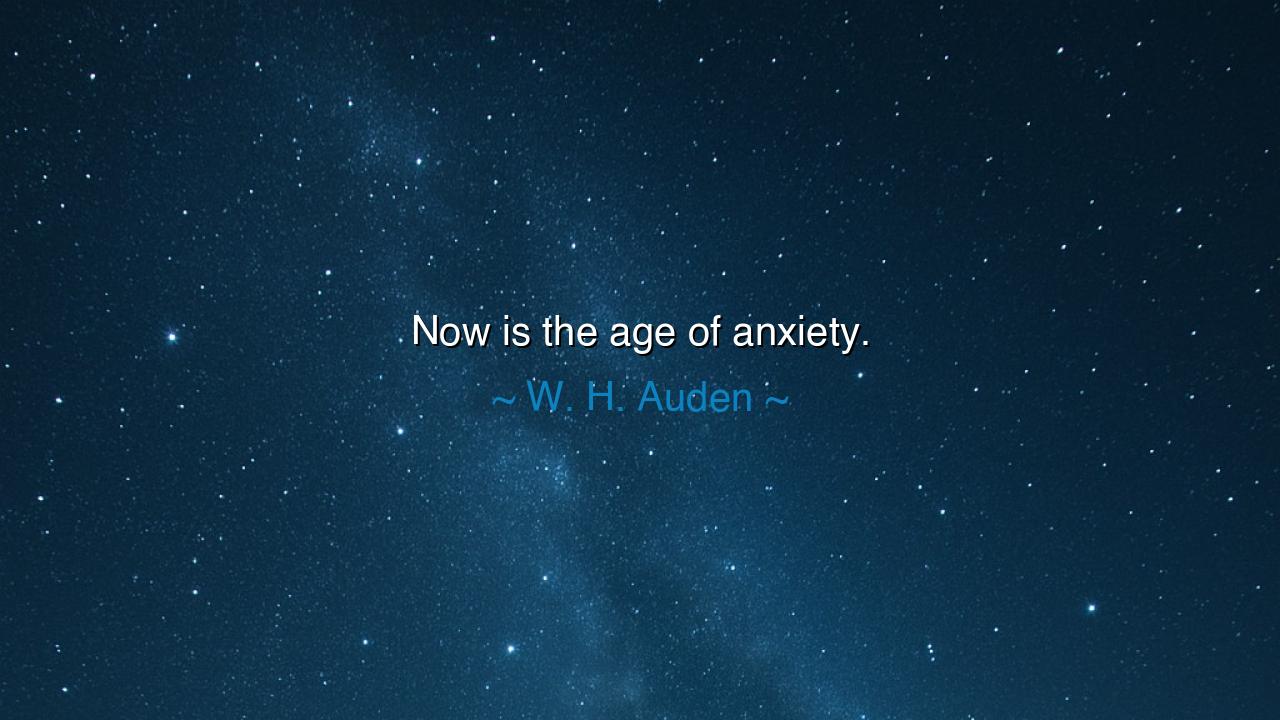
Now is the age of anxiety.






"Now is the age of anxiety." These words, penned by the profound poet W. H. Auden, speak to a timeless truth: that each era, each generation, has its unique burdens and challenges. Auden declares that our current age is marked by a profound, collective anxiety—a fear that grips not only individuals but entire societies. In this world, where technology evolves with blinding speed, where uncertainty reigns, and where the future feels ever more precarious, the weight of anxiety seems to bear down upon the hearts of men and women alike. But this is not a new phenomenon; rather, it is the manifestation of a deeper, human condition that has long existed, though it is perhaps more keenly felt in this modern age.
In ancient times, the sages of Greece and Rome understood the burdens of the human condition—fear, anxiety, and despair were not new inventions of modernity, but emotions that had always haunted the human soul. Socrates spoke of the soul’s need for clarity and purpose, recognizing that without inner peace, anxiety could take root and cloud one’s understanding of life. Epictetus, the Stoic philosopher, taught that true freedom is not the absence of external turmoil, but the mastery of one’s own mind—a mastery over anxiety, the ability to face challenges without being overcome by them. The ancients knew that the mind, if left unchecked, could spiral into fear and uncertainty, but they also understood that true strength comes not from avoiding anxiety but from facing it with resolve and wisdom.
In Auden's time, however, the anxiety of the modern world was fueled by the rapid transformations that the 20th century brought—the world wars, the collapse of empire, and the burgeoning of industrialization. Auden wrote during a period of immense social and political upheaval, when the individual, though more connected than ever through advances in communication and travel, often felt increasingly isolated and overwhelmed by the complexities of the world. The technological revolution, which promised progress, seemed to bring with it a greater sense of alienation. Auden's declaration was a lamentation of the fragmentation of the human spirit in the face of modernity’s relentless march. Anxiety in his time was not merely personal but societal—a disease infecting the collective soul of humanity, exacerbated by the forces of change and uncertainty.
Consider, O children, the example of the Roman Empire, which, at its peak, was the symbol of power, order, and stability. Yet, as the empire began to crumble, the anxiety of its citizens grew, for they could not escape the collapse of the institutions they had relied upon for centuries. The ancient Romans had created an expansive and powerful empire, but as it fell into decay, people feared for their future. Aurelius, the Stoic philosopher and emperor, wrote of the need to find peace despite the chaos around him. He knew that to live in an age of uncertainty required not just strength, but inner calm—the ability to control one’s own response to external threats. He understood that while empire may crumble, one’s soul does not have to be shaken. Aurelius’ words resonate with Auden’s reflection on anxiety: while the world around us may seem to spin out of control, our ability to master our own inner state is what determines whether we remain resilient or succumb to the fear of the unknown.
The modern age, as Auden recognized, is marked by anxiety—not just as an individual condition, but as a collective affliction. The rapid advancements in technology, globalization, and political turbulence have created a world in which many feel overwhelmed and powerless. Information, once a tool for understanding, now floods our minds, often bringing more confusion than clarity. We are told to be more, do more, and achieve more, but in the process, we lose sight of the peace that comes from stillness and acceptance. Auden’s words are a clarion call to recognize this anxiety, but also to confront it with awareness and understanding.
In this age, O children of wisdom, we must ask ourselves: how can we face the anxiety of our time with grace and courage? Just as Aurelius found solace in the quiet of his own mind, so too can we find peace in the present moment. Auden invites us to reflect not only on the anxiety that surrounds us but on how we might choose to respond. It is not the absence of anxiety that grants peace, but the ability to navigate it with clarity. We must not allow the weight of the world to crush our spirits but instead, like the Stoics of old, find strength in our inner fortitude.
Therefore, O seekers of wisdom, take heed of this truth: anxiety is not an affliction of the young alone, nor is it a passing moment—it is a part of the human condition that transcends time. But we have the power to shape how we respond to it. The lesson is clear: do not let the chaos of the world dictate your peace. Rather, cultivate a mind that is steadfast, a spirit that is resilient, and a heart that is open to the beauty that exists even amidst uncertainty. As Auden so eloquently reminds us, we live in an age of anxiety—but we also live in an age where the soul can find strength, if only we choose to look inward, to seek stillness, and to embrace the challenges with grace.






AAdministratorAdministrator
Welcome, honored guests. Please leave a comment, we will respond soon